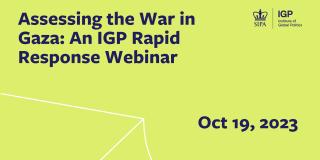Assessing the War in Gaza

On October 19, SIPA’s Institute of Global Politics convened an expert panel to consider the unfolding humanitarian situation in Gaza, the reaction and role of Israel’s Arab neighbors, and the ability of diplomacy to avert a humanitarian disaster and deter a wider war. Dean Keren Yarhi-Milo of SIPA, who is also the Adlai E. Stevenson Professor of International Relations, served as moderator.
The panelists spoke for about an hour — we’ve highlighted a few of their responses; the full program is embedded below.
Participating experts
- Lisa Anderson, Dean Emerita and Special Lecturer and James T. Shotwell Professor Emerita of International Relations at Columbia SIPA; former President, American University of Cairo
- Dave Harden, Founder and Managing Director at Georgetown Strategy Group; former USAID Mission Director to the West Bank and Gaza and Senior Advisor to President Obama's Special Envoy for Middle East Peace
- Dennis Ross, Diplomat; former US Special Envoy to the Middle East; William Davidson Distinguished Fellow at the Washington Institute for Near East Policy
- Shibley Telhami, Anwar Sadat Professor for Peace and Development, University of Maryland
- Kristele Younes, Lecturer in International and Public Affairs and Director of the Humanitarian Policy track of the Human Rights and Humanitarian Policy Concentration at Columbia SIPA; former Director of UN Policy for the International Rescue Committee in New York
On the importance of international law:
“International law applies to this crisis. And international law means that the rules of war need to be respected by all. We have decided as a community of nations that wars were so horrible that we wanted to inject some humanity to them — and by injecting some humanity we mean really trying to spare civilians the effect of conflict. In this particular conflict, civilians are not being spared. A violation by one party of the rules of war does not entitle another party to violate them as well. So we need to be very clear that all the parties to this conflict are bound by the same rules and that revenge and emotions are not appropriate reasons to violate them.”
— Kristele Younes
On the risks ahead:
“The days ahead could be much, much more dangerous than the days we've seen. We need to recognize that the region is a tinderbox. The Al-Ahli hospital bombing in Gaza demonstrated the enormous regional risks that are ahead of us. And so it’s important that we have some success, any small success in order to tip the trajectory away from enormous risk. I don't know why the US vetoed a humanitarian pause, but we need a humanitarian pause....
What I worry about is that the Biden administration is underprepared [to ensure the provision of humanitarian aid] and is dramatically underprepared for the risks that are ahead.”
— Dave Harden
On the interests of other countries in the region:
“Every one of the [Arab] leaders who didn't condemn Hamas publicly, and the two who did, would like to see Hamas defeated as a result of this. All of them fear Hamas coming out of this looking successful. Because if Hamas is successful, the ideology rejection gains great currency and puts these regimes even under more pressure and they're that much more defensive. On the other hand, the longer this goes on, and the higher the civilian toll, that puts these regimes under pressure. So they would love the Israelis to square the circle for them by succeeding very quickly without high civilian cost. And I'm not sure that's an option…..
You always have had a duality in the Arab world between where the leaders are and what they're saying publicly and what they might be feeling privately. I think at no time have we seen that as pronounced as it is right now.”
— Dennis Ross
“Hamas is really in many ways a symbol of a whole set of aspirations. You can defeat that particular group of people, but those aspirations are still there among the Palestinians.... there is widespread popular sympathy for [their desire for] bread, freedom, and social justice. This is the kind of demand that people were making a decade ago....
I don't see in the short to medium term that there's much incentive for [regional] governments that are already worried about their home fronts to reach out and say we can be helpful here. Now, clearly an American Initiative could incentivize that to some degree, but for the moment, nobody's going to rush in and be helpful.”
— Lisa Anderson
On US interests:
“Arabs and Jews, Israelis and Palestinians are going to have to live together — there's no way around that. And hopefully they'll live together in equity and dignity and mutual freedom. We don't know what outcome that will take [but] that's not what we have now. And it's not only because of Hamas....
The United States of America has interests separate from helping Israel. Helping Israel is an American interest — obviously that is on display now — but the ramifications matter to us. We're a big power. Our word matters globally. Our influence on Ukraine on Russia and China depends on what we do. That's why we have to be consistent in the way we do it.... So we need to be very careful asserting our own interest in addition to the steps that would take additional support for Israel.”
— Shibley Telhami
Watch the complete discussion: